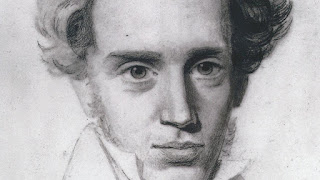FAITH AND RATIONALITY
This theme of the nature of the
Christian faith is a broad one and can therefore be treated from many different
aspects. In this text it is approached in the light of the thought of the
Christian philosopher Sören Aabye Kierkegaard. By citing the name of this
Danish thinker and theologian, one can immediately conclude that the Christian
faith will be analyzed here from the intrinsic aspect of its
irrationality. Due to the length of the problem, an argument concerning
only the incarnation of God will be presented.
It is notable that Kierkegaard
emphatically repudiates, in his complex literature, reason in favor of a
non-rational commitment, that is, faith in divine grace. Reason, this capacity
of the human mind to reach conclusions from presuppositions and premises, does
not reach the Truth that comes by Revelation. According to the Swiss theologian
Emil Brunner, it "is not given to us to know God, but to know the world.
For this reason, Kierkegaard opposed
the intellectual tendency of theologians and philosophers of his time to reduce
the doctrines of Christianity to terms that would make them more adequate to
human reason. Philosophers like Kant and Hegel, for example, who in their
search for a theology based on rationality, subjected religious consciousness
to the categories of reason in their studies. They were worthy representatives
of the Enlightenment, an intellectual movement of the 18th century
characterized by an emphasis on reason. And this was disastrous. Kant, for
example, reduced Christianity to good morals.
Kierkegaard reacts to these powerful
thinkers by claiming that Christianity is a paradox, that is, its Truth
contradicts rational logic and common intuition and can only be discerned
through faith. Incarnation, for example, "...requires us to believe that
there is a moment when the eternal enters the temporal sphere, taking on the
limitations of finite existence, and this seems to involve a manifest
impossibility, something that cannot be accommodated to the limits of human
thought and understanding"[1].
Of course, there is much rationality
in the Christian faith. However, not infrequently, the development of
theological reflection, based on divine Revelation, reaches certain borderline
areas of human rationality and leaps into the inexplicable that can only be
received by faith. Of course, there is much rationality in the Christian faith.
However, not infrequently, the development of theological reflection, based on
divine Revelation, reaches certain borderline areas of human rationality and
leaps into the inexplicable that can only be received by faith.
Divine Revelation is beyond human
thought. This particularity derives from the transcendent nature of spiritual
Truth. Divine Revelation deals with a spiritual world and is only understood by
man because it was given to him in a process of accommodation to human
categories. One must also understand that human reason is not infallible and
does not reach all areas of existence. Blaise Pascal, writing about the limits
of reason, said, "the last step of reason is to recognize that there is an
infinity of things that surpass it" [2].
Thus, it is necessary to consider
what the author of the biblical book Hebrews said: "faith is confidence in
what we hope for and assurance about what we do not see... without faith it is
impossible to please God, because anyone who comes to him must believe that he
exists and that he rewards those who earnestly seek him" (11:1-6). Reason
can take man to a certain point in understanding the world, but it does not
reach the instances of the mystery of God. The truth about His Being is beyond
the reach of reason. Only in the elevated instances of faith can one have a
glimpse of His majesty.
Antônio Maia – M.Div.
Copyright
[1] GARDINER, Patrick. Kierkegaard.
Edições Loyola, São Paulo, 1988, p.91
[2] PASCAL, Blaise. Pensamentos. Ed Abba
Press, São Paulo, 2002, p.50



Comments
Post a Comment